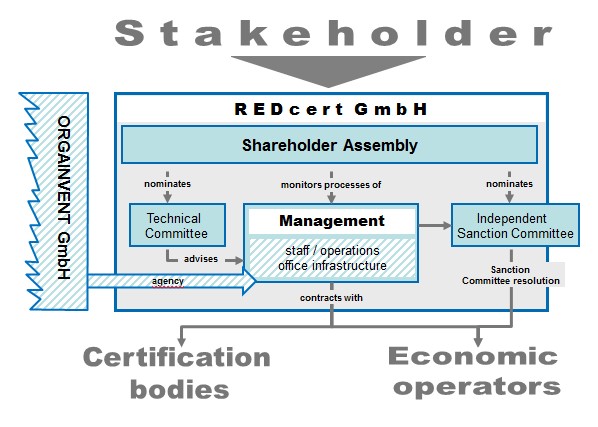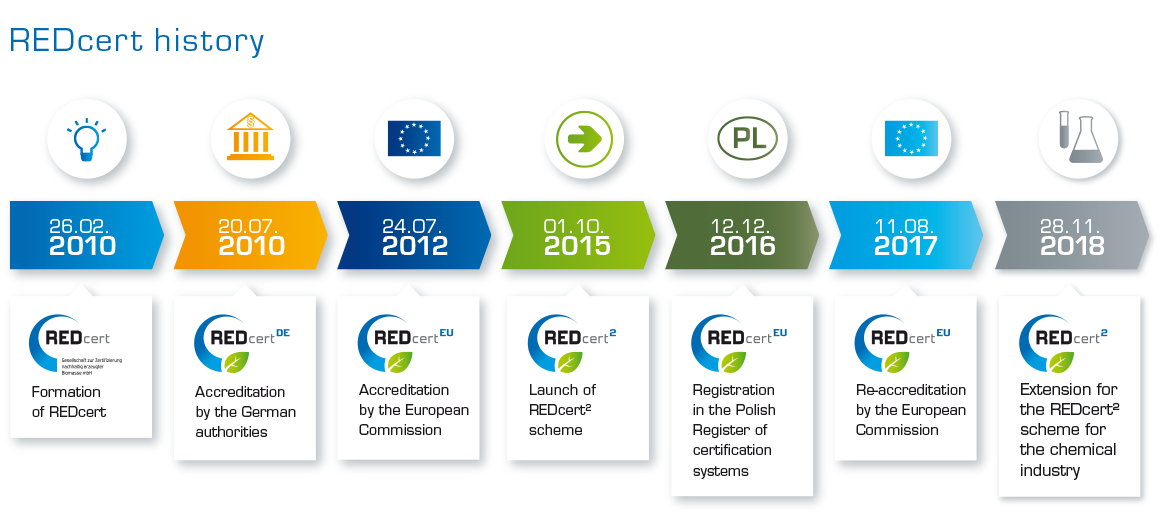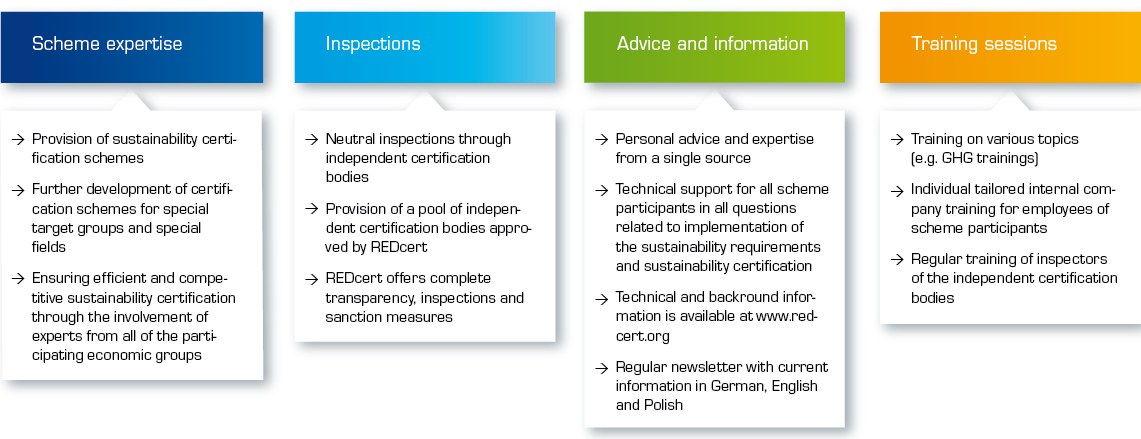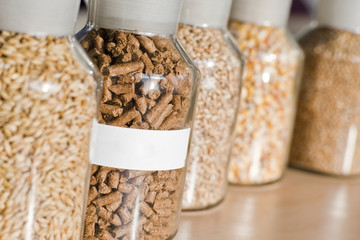Über uns_EN
Organisational structure of REDcert
The REDcert certification scheme is operated by REDcert Gesellschaft zur Zertifizierung nachhaltig erzeugter Biomasse mbH which is also the owner of the ‘REDcert” brand. The company focuses on the following activities:
- development, evaluation and modification of scheme requirements to comply with legal and operational specifications
- operation of the certification scheme (registering economic operators, certification bodies, issuing certificates, etc.)
- measures to assure the integrity of the scheme and prevent misuse and fraud
- measures related to transparent scheme management
- measures for dealing with complaints
- support for producers (companies) and economic operators in scheme implementation
The figure below provides an overview of REDcert’s organisational structure:

REDcert - Your partner for sustainability certification
With the introduction of a mandatory sustainability certification for biofuels and bioliquids on the basis of the EU Directive on Renewable Energy, the European agricultural and bioenergy sector implemented the very first internationally valid sustainability regulation for biofuels in the world. Germany has played a pioneering role in these efforts since the Sustainability Ordinances went into force on 1 January 2011.
To support the practical implementation of the Sustainability Ordinances, REDcert GmbH was founded by leading associations and organisations of the German agricultural and biofuel economy on 26 February 2010. With the approval of the scheme of the same name on 20 July 2010 (the REDcert-DE scheme at that time), the economic groups affected assumed joint responsibility for actively promoting biofuels and liquid biomass certified as sustainable.
Today REDcert operates one of the leading certification schemes for sustainable biomass, biofuels and biofuels (REDcert-DE and REDcert-EU) in Germany and Europe. The issue of “sustainability” no longer just affects the requirements for greenhouse gas reduction and traceability of biomass in the biofuel industry, it also plays an important role in the procurement of sustainable raw materials for the food and animal feed industry as well as for biomass for material use. As a result, REDcert² has been available as a certification scheme for sustainable agricultural raw materials for processing in these sectors since 2015.
In 2018, the scope of the REDcert² scheme in the area of biomass use for material purposes was expanded to include another important economic sector with the introduction of the "Supplementary REDcert² scheme principles for the chemical industry" . The chemical industry is also increasingly relying on the use of sustainably produced and certified biomass to replace fossil-based raw materials. It therefore makes an important contribution to reducing greenhouse gases and conserving fossil-based resources.

Many of the key concerns of the economic groups affected have been taken into account in setting up the REDcert scheme. They, along with the relevant legal requirements, served as the basis for the design of these certification schemes.
REDcert's work is based on the following principles:
Social responsibility
The contribution that biofuels and bioliquids make in the fight against climate change goes hand-in-hand with society's expectation that the government incentive system – in this case mainly tax relief for biofuels - is applied in compliance with laws. Just as important, however, is society's right to effective measures when it comes to sustainability, e.g. with respect to greenhouse gas balances or socially responsible business practices consistent with recognised standards. In this context, REDcert is required, just like any other certification scheme, to formulate the necessary rules and ensure that they are complied with.
Competition
The global dimension of sustainability certification poses great challenges for certification schemes and certification bodies. The prerequisites for sustainability certification are different depending on the type of biomass, what it is used for and the place it is produced or used. It is thus important for the economic groups affected to create adequate competition in the scheme environment and have different certification options to choose from depending on use.
Consistent 100% legal compliance (in the biofuel sector)
The REDcert schemes (REDcert-DE and REDcert-EU) guarantee legal compliance with certification requirements for the sustainable production of biomass in accordance with RED (Renewable Energy Directive - Renewable Energies Directive). In addition, it defines requirements for social criteria for the producing and processing companies along the biomass supply chain. These requirements were adopted from various ILO conventions. This guarantees compatibility with all other officially approved certification schemes in the acceptance and sale of sustainable biomass and prevents restrictions or even hindrances in the movement of goods.
Commitment to accountability
By creating an industry-driven certification scheme (REDcert-DE) in 2010, the economic groups affected by the new legislation confirmed their willingness to take on individual responsibility and not just passively wait around for the “inevitable” certification to be imposed on them. Instead, they took advantage of the opportunity afforded to them to design the scheme and actively encourage “sustainability”.
Actively shaping the future
Launching sustainability certification for biomass for energy use created a framework for certifying all types and uses of biomass in the future – if this were to be required either through legislation or market influences. Since most companies, in addition to generating electricity from biomass, are already experimenting with different uses of biomass either with co-products or secondary products or the same “input material”, there will be enough time to set a new course in these companies.
Capitalising on synergies
The multiplicity of certification schemes for the various forms of biomass use are taxing for companies, not just in organisational terms (documentation, verification, etc.), but also financially because each scheme usually has its own certification requirements, e.g. with regard to inspection intervals and inspector qualification. The goal here is, with the help of the REDcert scheme, to identify and capitalise on the potential synergies relating to disclosure and verification early on but also in the certification process itself (neutral inspections). This also includes extending the scope of REDcert's certification programme to include other forms of biomass use (see REDcert²). The aim is to develop a certification concept that provides a solution for the production of raw materials that is independent of the end users and recognised in all areas of biomass use.
Encouraging ease of application in practice
The involvement of experts from all of the economic groups affected, particularly practitioners from the interfaces, aims to ensure that the structure of the scheme is aligned with practical needs.













